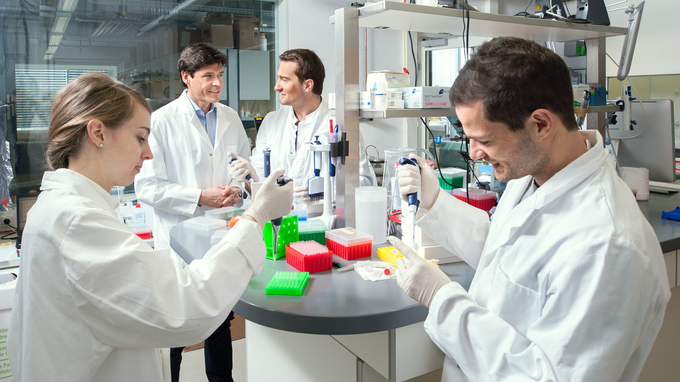Zwei weitere ERC-Grants ans Physik-Department
Hochdotierte EU-Förderung
2016-12-23 – Nachrichten aus dem Physik-Department
Seit 2008 verzeichnet die TUM 71 ERC-Grants, davon stammen 17 aus dem Physik-Department, also fast ein Viertel. Die ERC-Grants werden in verschiedenen Kategorien vergeben. Starting Grants für vielversprechenden wissenschaftlichen Nachwuchs und Consolidator Grants für Forscherinnen und Forscher, deren Promotion sieben bis zwölf Jahre zurückliegt. Zusätzlich werden Proof of Concept Grants an Wissenschaftler vergeben, die prüfen wollen, ob aus ihren ERC-Forschungsprojekten marktfähige Innovationen entstehen können.
ERC Consolidator Grant für Prof. Dr. Hendrik Dietz
Professor Hendrik Dietz, Inhaber des Lehrstuhls für Experimentelle Biophysik am Physik-Department, erhält einen ERC Consolidator Grant für ein Forschungsprojekt zu DNA-Origami-Motoren.
Während das traditionelle Origami Papier in neue Formen bringt, falten Dietz und sein Team DNA-Moleküle zu wenigen Nanometer großen zwei- oder dreidimensionalen komplexen Formen. DNA-Origami-Motoren, wie sie im Rahmen des aktuellen Projekts entwickelt werden, sind winzige Maschinen, die von Vorbildern aus der Natur inspiriert sind – etwa von Flagellen, mit deren Hilfe sich einige Bakterien fortbewegen. Das Ziel von Hendrik Dietz und seinem Team ist es, Motoren zu entwickeln, die gerichtete Bewegungen ausführen können. In Zukunft könnten Motoren aus DNA beispielsweise dazu eingesetzt werden, um Nano-Geräte zur Verabreichung von Medikamenten an ihren Bestimmungsort zu bringen.
Hendrik Dietz promovierte 2007 an der TUM, danach forschte er an der Harvard Medical School. Seit 2009 ist Dietz Professor für Experimentelle Biophysik an der TUM. Er ist unter anderem Carl von Linde Senior Fellow am Institute for Advanced Study (IAS) der TUM und wurde von der Deutschen Forschungsgemeinschaft mit dem Gottfried Wilhelm Leibniz-Preis ausgezeichnet. Der ERC hatte seine Forschung zu DNA-Origami bereits 2010 mit einem Starting Grant gefördert.
Proof of Concept Grant für Prof. Dr. Andreas Bausch
Das Handling von Flüssigkeiten ist ein integraler Bestandteil der biologischen und medizinischen Forschung. Für viele Anwendungen ist die Methode der Wahl manuelles Pipettieren – obwohl es zeitaufwändig und fehleranfällig ist. Zwar gibt es für Hochdurchsatz-Anwendungen Pipettier-Roboter, doch für viele kleine Arbeiten sind sie nicht einsetzbar.
Innerhalb des ERC-geförderten Projekts SelfOrg entwickelten Professor Andreas Bausch und seine Gruppe ein kleines, automatisiertes Liquid Handling Gerät (AutoLiqHand) für die individuelle Nutzung. Die Mikrofluidik-Plattform automatisiert biomedizinische Experimente und diagnostische Routinen. Darüber hinaus ermöglicht ihr einzigartiges Design, sie flexibel für eine große Zahl von Aufgaben einzusetzen. Das Proof-of-Concept-Projekt zielt auf die Anpassung der AutoLiqHand-Plattform an Marktbedürfnisse und auf Optimierungen ab, die ihre Produktion erleichtern.
Nach dem Physikstudium an der TUM und der Université de Montréal promovierte Andreas Bausch 1999 an der TUM. Ein Emmy Noether Stipendium führte ihn an die Harvard University (Boston, USA). Seit 2008 hat Prof. Andreas Bausch den Lehrstuhl für Zellbiophysik an der TUM inne. Dort forscht er mit dem Ziel, die mechanischen Eigenschaften des Zytoskeletts und die mikroskopischen Mechanismen der Selbstorganisation quantitativ zu verstehen. Ein weiterer Forschungsschwerpunkt ist die Identifizierung und physikalische Charakterisierung neuer biomimetischer Materialien.
- Redaktion
- Paul Hellmich, Dr. Johannes Wiedersich
Verwandte Meldungen
- Alle aktuellen ERC Grants an der TUM
- Friedrich Simmel und Franz Pfeiffer erhalten ERC-Grants – 2016-04-25
- ERC-Grant für Reinhard Kienberger – 2015-03-20
- ERC-Grants für Prof. Buras und Prof. Dietz – 2011-01-19
